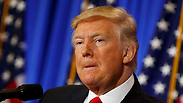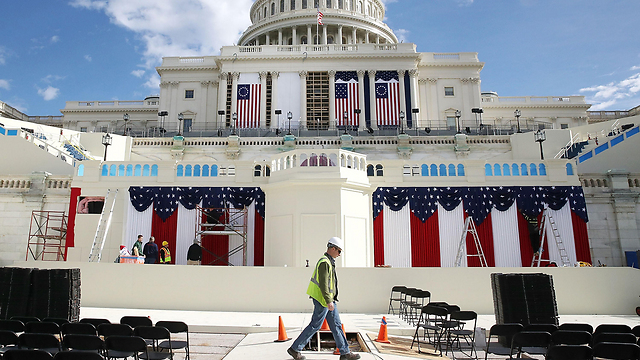
Donald Trump. A huge majority of the US Jewry experienced a terrible rift upon his election
צילום: AP
Israel and US Jewry moving further apart
Op-ed: The large gap between the feelings of the Jewish majority in Israel and the feeling of most US Jews following Donald Trump’s election should serve as a warning sign to all of us. It reflects processes that both the Jewish-Israeli and the Jewish-American societies are going through.
This coming weekend, US President-elect Donald Trump will stand at the foot of the US House of Representatives and swear allegiance to the United States and to its constitution. In one small Middle Eastern state thousands of miles away, the State of Israel, there will be many happy people that day.

While the sigh of relief upon the end of US President Barack Obama’s term is not shared by all Israelis, many people—not just in the clear Israeli Right—are waiting for the moment Trump enters the White House. The new tone of the incoming administration officials towards Israel, the feeling that Trump and his government will be more attentive to the stances of Israeli majority, and the symbolic gesture—perhaps only an intention—of moving the embassy to Jerusalem make the whole difference as far as many Israelis are concerned.

Preparations for Trump’s inauguration. A future Democratic administration, especially if it is filled with Jews, may be so oppositional to Israel that it will make us miss Obama (Photo: AFP) (צילום: AFP)
At the exact same time, millions of American Jews will experience an exact opposite feeling. There too, this feeling will not be shared by all Jews. There are likely many American Jews, mainly Orthodox and Haredi, who will share the joy of Israel’s citizens, but the large majority of the US Jewry will experience a difficult rift.
This majority includes all members of the liberal, Reform and Conservative communities, some members of the Modern Orthodox communities, and the growing share of Jews who are not part of any congregation. This large group, which is a huge majority of the US Jewry, experienced a terrible rift upon Trump’s election, and his inauguration day will be one of the most difficult days in its history.
This large gap between the feelings of the Jewish majority in Israel and the feeling of most US Jews should serve as a warning sign to all of us. It is neither a specific nor an incidental gap. It reflects deep processes that both the Jewish-Israeli and the Jewish-American societies are going through.
These two societies, which have been linked through strong blood relations for three or four generations, are moving further away from each other. The US Jewry, which has worked over the years to guarantee that the US would stand by Israel at any situation, is no longer convinced that it is the right thing to do. The State of Israel, on its part, is finding new allies in America, including the large evangelical communities, for example, but not just them.
The Trump administration will hopefully sympathize with the State of Israel, as its senior officials have been promising us in recent months. There are good reasons to assume that at least on the declarative level it will be more attentive to the current Israeli government’s stances.
Nevertheless, the growing gap between the State of Israel and the US Jewry should concern us when we consider the day after the Trump era. It would be wrong to assume that the tens of thousands of AIPAC representatives will still be there for Israel then. A future Democratic administration, even if it is filled with Jews, and especially if it is filled with Jews, may be so oppositional to Israel that it will make us miss Obama.










